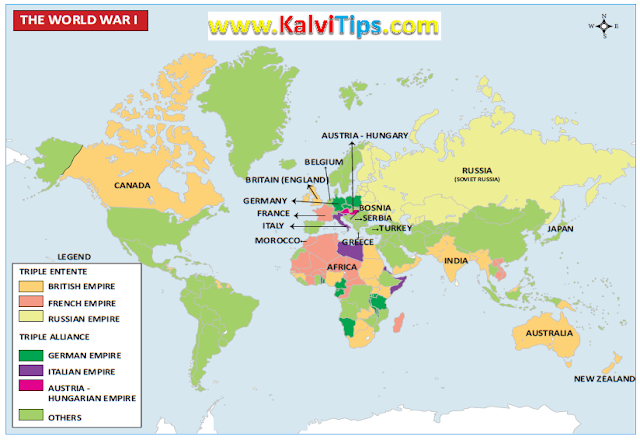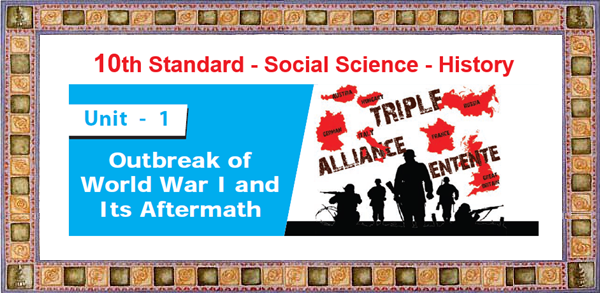Tamil Nadu Board 10th Standard Social Science - History Unit 1: Book Back Answers and Solutions
This post covers the book back answers and solutions for Unit 1 – History from the Tamil Nadu State Board 10th Standard Social Science textbook. These detailed answers have been carefully prepared by our expert teachers at KalviTips.com.
We have explained each answer in a simple, easy-to-understand format, highlighting important points step by step under the relevant subtopics. Students are advised to read and memorize these subtopics thoroughly. Once you understand the main concepts, you’ll be able to connect other related points with real-life examples and confidently present them in your tests and exams.
By going through this material, you’ll gain a strong understanding of History Unit 1 along with the corresponding book back questions and answers (PDF format).
Question Types Covered:
- 1 Mark Questions: Choose the correct answer, Fill in the blanks, Identify the correct statement, Match the following
- 2 Mark Questions: Answer briefly
- 3, 4, and 5 Mark Questions: Answer in detail
All answers are presented in a clear and student-friendly manner, focusing on key points to help you score full marks.
All the best, Class 10 students! Prepare well and aim for top scores. Thank you!
Unit 1: Outbreak of World War I and Its Aftermath
I. Choose the correct answer.
a) Germany, Austria - Hungary, and the Ottomans
b) Germany, Austria-Hungary, and Russia
c) Spain, Portugal and Italy
d) Germany, Austria-Hungary, Italy
Answer Key:
a) Germany, Austria - Hungary, and the Ottomans
a) China
b) Japan
c) Korea
d) Mongolia
Answer Key:
b) Japan
a) Lenin
b) Marx
c) Sun Yat-sen
d) Mao TseTung
Answer Key:
a) Lenin
a) air warfare
b) trench warfare
c) submarine warfare
d) ship warfare
Answer Key:
b) trench warfare
a) Britain
b) France
c) Dutch
d) USA
Answer Key:
a) Britain
a) Germany
b) Russia
c) Italy
d) France
Answer Key:
II. Fill in the blanks.
1. Japan forced a war on China in the year _____.2. The new state of Albania was created according to the Treaty of _____ signed in May 1913.
3. Japan entered into an alliance with England in the year _____.
4. In the Balkans, _____ had mixed population.
5. In the battle of Tannenberg _____ suffered heavy losses.
6. _____ as Prime Minister represented France in the Paris Peace Conference.
7. Locarno Treaty was signed in the year _____.
Answer Key:
1. 1894
2. London
3. 1902
4. Macedonia
5. Russia
6. Clemenceau
7. 1925
III. Choose the correct statement.
1. i) The Turkish Empire contained many non-Turkish people in the Balkans.ii) Turkey fought on the side of the Central powers
iii) Turkey’s attempts to attack Suez Canal were repulsed.
a) i) and ii) are correct.
b) i) and iii) are correct.
c) ii) and iii) are correct.
d) i), ii) and iii) are correct.
Answer Key:
d) i), ii) and iii) are correct
2. Assertion (A): The first European attempt to carve out colonies in Africa resulted in bloody battles.
Reason (R): There was stiff resistance from the native population.
a) Both A and R are correct.
b) A is right but R is not the correct reason.
c) Both A and R are wrong.
d) R is right but A is wrong.
Answer Key:
a) Both A and R are correct.
IV. Match the following.
|
1
|
Treaty of Brest- Litovs
|
Versailles
|
|
2
|
Jingoism
|
Turkey
|
|
3
|
Kemal Pasha
|
Russia with Germany
|
|
4
|
Emden
|
England
|
|
5
|
Hall of Mirrors
|
Madras
|
|
1
|
Treaty of Brest- Litovs
|
Russia with Germany
|
|
2
|
Jingoism
|
England
|
|
3
|
Kemal Pasha
|
Turkey
|
|
4
|
Emden
|
Madras
|
|
5
|
Hall of Mirrors
|
Versailles
|
V. Answer briefly.
1. How do you assess the importance of Sino-Japanese War?Answer Key:
- The Sino - Japanese War happened during 1894 - 1895.
- In this forced war, tiny Japan defeated China. Against the warning of Russia, Germany and France, Japan annexed Liaotung peninsula with Port Arthur.
- This annexation proved to the world that Japan was the strongest Nation in East Asia.
2. Name the countries in the Triple Entente.
Answer Key:
- Britain
- France
- Russia.
3. What were the three militant forms of nationalism in Europe?
Answer Key:
- Jingoism of England, Chauvinism of France and Kultur of Germany were the three militant forms of nationalism in Europe.
4. What do you know of the trench warfare?
- Trenches (or) ditches dug by troops enabled soldiers to safely stand and protect themselves from enemies’ fire.
- The main lines of trenches were connected to each other.
- Food, ammunition, fresh troops, mail and orders were delivered.
- The Battle of Marne is a memorable for “Trench Warfare”.
5. What was the role of Mustafa Kemal Pasha?
Answer Key:
- Mustafa Kemal Pasha played a remarkable role for Turkey’s rebirth as a nation.
- Kemal Pasha modernised Turkey and changed it out of all recognition.
6. List out any two causes for the failure of the League of Nations.
Answer Key:
- The League appeared to be an organisation of those who were victorious in the First World War.
- Since it lacked the military power of its own, it could not enforce its decisions.
VI. Answer the following in detail.
1. Discuss the main causes of the First World War. Answer Key:
European Alliances and Counter Alliances:
- Europe was divided into two military camps viz. Central Powers and the Allies.
- Germany, Austria - Hungary, and Italy, (Central Powers) formed the Triple
- Alliance in 1882 under the guidance of Bismark.
- England, France and Russia (the Allies) formed the Triple Entente.
- Thus the two blocks called “the Central Powers and the Allies” became possible
- to confront each other.
- With the growth of nationalism, the attitude of “my country right or wrong. I support it” developed.
- England’s jingoism, France’s chauvinism and Germany’s Kultur were militant forms of nationalism.
- Emperor Kaiser Wilhelm II declared that Germany would be the leader of the world.
- Unable to forget the humiliating defeat at Trafalgar, Germany built naval bases rapidly.
- Being aware of a possible attack from Germany, Britain also embarked on a naval race.
- This increased the tension between these two countries.
- France continued to nurse the pain of losing Alsace and Lorraine to Germany.
- Germany's interference in Morocco added to its bitterness.
- Austria and Russia resume their activities in the Balkans with the “Young Turks Revolution of 1908.
- The enmity between Austria (with the support of Germany) and Serbia (with the support of Russia) led to the outbreak of war in 1914.
- Taking advantage of the politics and economic instability of the Turkish empire the Balkan Countries began to secede from the Turkish control.
- All central powers were directed to pay war indemnity.
- All German Colonies became mandated territories under the League of Nations.
- The Balkan League was formed and defeated Turkish forces.
- The First Balkan War (1912 - 1913) ended with the Treaty of London.
- As per the Treaty Albania was created, Macedonia was divided and Turkey was reduced.
- In the Second Balkan War, Bulgaria attacked Serbia and Greece.
- But Bulgaria was defeated easily. The Second Balkan War ended with the Treaty of Bucharest in August 1913.
- On 28th June 1914, Austrian Crown prince Franz Ferdinand was assassinated by Bosnian Serb called Princip at Sarajevo in Bosnia.
- Austria wanted to eliminate Serbia.
- Germany declared war on Russia on 1st August 1914.
- Germany had to attack France as they had made an alliance with Russia.
- The German violation to Belgian neutrality forced Britain to enter the war.
2. Highlight the provisions of the Treaty of Versailles relating to Germany.
Answer Key:
- After the First World War on 28 June, 1919 the peace treaty was signed in the “Hall of Mirrors” at Versailles. It’s Provisions relating to Germany are ;
- Germany was found guilty of starting the war and therefore was to pay reparations for the losses suffered.
- German army got reduced to the minimum of 1,00,000 soldiers. A small navy was allowed.
- The Union of Austria and Germany was forbidden.
- Germany was forces to revoke the Treaty of Brest - Litovsk.
- Alsace and Lorraine were returned to France.
- Former Russian territories of Finland, Estonia, Latvia and Lithuvania gained independence.
- 7Denmark received Schleswig.
- Poland was recreated.
- Allies occupied Rhineland demilitarising the east bank.
3. Explain the course of the Russian Revolution under the leadership of Lenin.
Answer Key:
- Lenin was in Switzerland when the revolution broke out.
- His slogans “All Power to Soviets” and “Bread, Peace and Land” attracted the masses.
- Bolsheviks rose against the Provisional Government.
- It had failed to redistribute lands and decided to continue the war.
- These were resented by the masses.
- In October 1917, Lenin persuaded Bolshevik Central Committee to decide on immediate revolution.
- Trotsky prepared a detailed plan.
- On 7th November, the key Government buildings were seized by armed factory workers and revolutionary troops.
- On 8th November 1917, a new Government was in office in Russia.
- This time Lenin was the head.
- Bolshevik party was renamed as the “Russian Communist party.”
- Lenin opted for withdrawing from the war.
- In March 1918, the Treaty of Brest - Litovsk was signed.
- He concentrated on the formation of a new Government to implement reforms
- seriously.
4. Estimate the work done by the League of Nations. (PTA - 4, Apr.-24)
Answer Key:
- The League of Nations was established in 1920 to avoid war and maintain peace in world.
- From 1920 to 1925, the League of Nations was asked to settle a number of issues.
- It was successful in tackling three issues.
- In 1920, a dispute arose between Sweden and Finland over the Sovereignty of Aaland Islands.
- The League ruled that the Aaland islands should go to Finland.
- In 1921, the League was asked to settle the frontier between Poland and Germany in upper Silesia.
- It was successfully resolved by the League.
- In 1925, Greece invaded Bulgaria. The League ordered a ceasefire and made Greece pay reparations.
- Thus the League had been successful until the signing of the Locarno Treaty of 1925.
- By this treaty Germany, France, Belgium, Great Britain and Italy mutually guaranteed peace in Western Europe.
VII. Activity.
1. Students can be taught to mark the places of battles and the capital cities of the countries that were engaged in the War.Answer Key:
(a) Battles of I World war:
(i) Battle of Tannenberg
(ii) Battle of Marne
(iii) Battle of Gallipoli
(iv) Battle of Jutland
(v) Battle of Verdun
(vi) Battle of Passchendaele
(vii) Battle of Caporetto
(viii) Battle of Cambrai
(ix) Battle of the Somme.

Central powers & Capital:
(i) Germany – Berlin
(ii) Austria – Vienna
(iii) Hungary – Budapest
(iv) Italy – Rome
(v) Ottoman Empire – Istanbul, Bursa, Edirne, Sogut
(vi) Bulgaria – Sofia
(vii) Turkey – Ankara
Allies- Capital:
(i) Great Britain – London
(ii) France – Paris
(iii) Russia – Moscow
(iv) Italy – Rome
(v) United States – Washington D. C

VIII. Map Work.
Mark the following countries on the world map.1. Great Britain
2. Germany
3. France
4. Italy
5. Morocco
6. Turkey
7. Serbia
8. Bosnia
9. Greece
10. Austria-Hungary
11. Bulgaria
12. Rumania










0 Comments:
Post a Comment